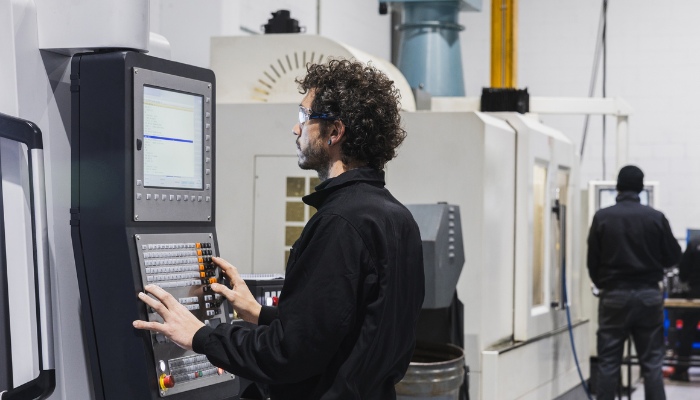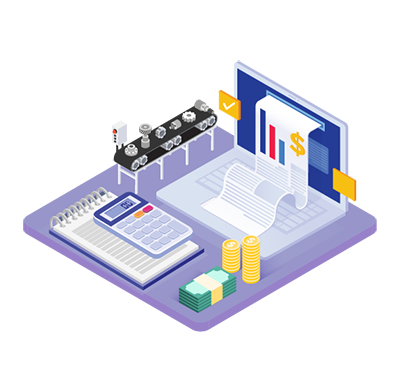ERP Pricing Calculator
Use our ERP pricing calculator to get a ballpark cost based on your company’s profile.

Buying an ERP is one of the biggest business decisions your company will ever make. An ERP is a huge investment that will have a significant impact on both your day-to-day operations and your manufacturing business’s long-term success. This makes making the right choice crucial. You need to choose a system that will have a positive impact on many different aspects of your business, from boosting operational efficiency to driving growth.
Below, we cover five things you should keep in mind to help you find the right system for you.
There are so many different ERP systems on the market today, all with different features and different price tags. Before you start shopping for a system, you should have a handle on precisely what you are looking for, what business needs must be met, and what your budget is.
Having your budget—and your list of needs and wants—nailed down from the start will help make the shopping process easier. By analyzing your needs, you can determine which type of ERP system and implementation approach will best benefit your company. Researching different tiers of systems and pricing models will help you narrow down your options and find the system that fits both your needs and your budget.
Understanding costs upfront, along with what you are willing to spend, will help you make the right financial decision for your company. Nobody wants unexpected surprises when it comes to budget, so a bit of preparation ahead of time will help you avoid hidden costs and make the best decision for your business.
Use our ERP pricing calculator to get a ballpark cost based on your company’s profile.

The most well-known ERP system may not be the right choice for you. An ERP won’t be a good fit for your company if the ERP provider doesn’t understand your industry.
Gone are the days of the one-size-fits-all ERP system. Today, there are many specialized systems out there designed to fit the needs of different industries. Find an ERP system that is right for your niche.
Industry-specific ERPs are often developed by smaller companies that are made up of a team of industry experts who focus solely on solving the unique needs of a particular industry. These systems will include standard ERP features, like accounting and project management, but will also have features that target the unique needs of the industry for which they were built.
For example, an ERP system designed for the manufacturing industry will include an MRP (Materials Requirement Planning) module, along with other customized features that manufacturers need, like specialized scheduling systems, quoting and estimating and shop floor management.
Industry-specific ERPs have better, more tailored capabilities because they have been designed with a deep understanding of industry-specific processes in mind.
ERP implementation projects are notoriously challenging. Only 27% of ERP implementations are delivered on time, and around 30% are considered outright failures. (FYI: 86% of Genius ERP’s implementation projects are delivered on time, and 88% of our ERP projects deliver the expected benefits, well above industry averages.)
Even the best ERP for your business will not be helpful if it is never successfully implemented. Ensure your provider has a solid implementation plan and a proven track record.
Most ERP providers will have training and implementation built into their processes (and costs). Find out how a potential vendor plans to handle implementation and what their defined training processes are: What teaching and training methods do they use? How do they teach users? Is training flexible? Do they offer hands-on simulations? How do they measure knowledge growth?
We recommend working directly with the ERP provider rather than an external consultant. This is typically more cost-effective and ensures you work with someone who knows the system inside and out. As manufacturing experts, they will also better understand your business and can help you define your priorities and create a tailored plan and roadmap to ensure you get the right features put in place from the start. This will help you complete your implementation project on time—and start to get value from your system.
After implementation, you don’t want to be left high and dry. Obviously, implementation is a huge piece of the ERP puzzle, but your ERP provider will also become a long-term partner for your business. Most manufacturing companies have their ERP system for ten years or even longer.
You want to make sure that your provider offers ongoing support, helping you to sort out any system issues that crop up, but also helping you to deal with new business challenges as they come along. Your business won’t stay static over a decade, so you have to make sure that you have a system that can grow and change with you and offer you support and guidance while you do so. Selecting an ERP system is not just about addressing your current needs. It’s about envisioning where your company will be in five years and selecting a system that can evolve with you. The ERP system you choose should be able to change and grow with your business.
Your ERP needs to fit in with the big picture you have for your business, along with the day-to-day aspects of your business. An ERP must help you reach your long-term business goals, but it also must offer a positive user experience. You won’t revolutionize your shop if nobody likes using your ERP system.
Some of this comes down to training—remember point number 3 above—as your team must learn how to comfortably navigate and use the system. But you also want to ensure that your ERP is intuitive and easy to use. As a busy manufacturer, many of the things your ERP helps with don’t happen in a back office but on your shop floor or loading dock. Can you use your ERP system on a mobile device to help complete these important jobs?
We also know that no single system can handle everything. Ensure your ERP integrates seamlessly with the software your team already uses, like CAD or nesting software.
As much as your ERP needs to offer high-level solutions, it also needs to fit in with your day-to-day.
Choosing the right ERP system requires careful consideration of your business’s unique needs, budget, and long-term goals. By doing your research and planning ahead, you’ll be better equipped to find an ERP that not only fits your business today but also supports its growth in the future.
Looking for more help in finding the right ERP for your business? Download our eBook, How To Select the Right ERP, and learn the five must-follow steps for selecting the right ERP for your business.
"*" indicates required fields